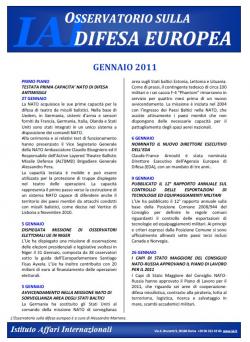Observatory on European defence, February 2005

21 February 2005
EU General Affairs and External Relations Council - Middle East, Iraq Mission
The Council discussed the Middle Eastern situation, confirming its support for the relaunch of the Israeli-Palestinian peace process, expressing its concern for the situation in Beirut following the murder on 14 February of the former Lebanese Prime Minister Hariri and requiring the withdrawal of Syrian forces from Lebanon in accordance with UN Security Council Res.1559 (2 September 2004).
Moreover the GAERC adopted a Common Action on the EU “EUJUST LEX” mission aimed at training about 800 Iraqis including politicians, magistrates/judges (civil service) and police officers. The mission in support of the Rule of Law will be started by 1 July and carried out outside Iraqi territory because of the poor security conditions there. On the proposal of the European Commission, a further 200 million euros have been allocated for the rebuilding of Iraq (in addition to the 350 already allocated and the 2.2 billion individually promised by some EU member States).
On 22 February, NATO announced that all 26 members will contribute in some way to the mission training Iraqi security forces. NATO will set up a provisional centre in Baghdad composed, in the early stages, of 160 people including trainers and logistic and protection forces (instead of the 300 initially foreseen). Ukraine has confirmed its withdrawal from the military mission of the coalition in Iraq, although it does not exclude that some of its troops could participate in the NATO training mission.
22 February 2005
US-EU, US President’s Visit - China Arms Embargo
During his visit to the EU, carried out in a mood of dialogue and reconciliation, US President Bush dealt with several issues on international policy.
He confirmed the transatlantic contrast over Europe’s plan to lift the arms embargo on China; the US Congress, which opposes the lifting because of the risk of transfer of sensitive technology and the impact on the Taiwan strategic balance, requires guarantees and is threatening retaliation. France has confirmed its support for lifting the embargo, supporting its thesis by pointing to Canada, which never approved the embargo, and Australia, which lifted it 10 years ago.
On 16 February, the High Representative for CFSP Solana, defining the embargo anachronistic and opposed to the development of relations with Beijing, underlined that countries like Israel and Australia sell arms to China. He also pointed out that there are rules at European level (Code of Conduct) that would continue to be applied.
February 2005
European Union - Fight Against International Terrorism
Over the month, several European bodies dealt with measures to counter international terrorism. The EU Commissioner for Justice, Freedom and Security Franco Frattini presented a report draft which the European Commission will adopt to commemorate the attacks of 11 March 2004 in Madrid.
On 10 February, the first Eurojust meeting was held to coordinate European prosecuting attorneys and counter-terrorism enquirers (Germany, France, the United Kingdom, Italy, Belgium, and the Netherlands) and their US equivalents.
On 17 February, the ECOFIN adopted (by a majority vote, with only the Italian vote against) a Common Position in view of the adoption of a Regulation on controlling money flows to counter the financing of terrorism.
On 23 February, the European Commission published a critical report on the implementation of European Arrest Warrant one year after its introduction, underlining that 10 members do not apply it properly and that Italy has not applied it at all; Italy is the only State which has not yet introduced in its own legislation for the European Arrest Warrant which was supposed to enter into force throughout the EU on 1 January 2004.
On 24 February, the Justice and Home Affairs Council discussed the proposal of framework decision on European Evidence Warrant for some crimes, including terrorism; after a year of vain attempts, the German Max-Peter Ratzel was appointed director of Europol.
The Council decided to empower Europol and Eurojust to access the Schengen Information System (SIS), the computerized network available to police and consular officers providing data on suspect people, objects and wanted vehicles.
Finally, during a meeting at the justice minister level with the US counterpart on 1 February, the EU Presidency committed itself to verifying that the 15 EU pre-enlargement members complete procedures for the entry into force of bilateral agreements on extradition and reciprocal judicial help.
February 2005
EU, ESA, United States - Military Application of Galileo
The European Commission, upon the urging of Jean-Pol Poncelet, Director of Strategy and External Relations of the European Space Agency (ESA), who had reproached Europe for its renunciation of a military application of the Galileo satellite navigation system, clarified that the agreement signed with the US in June 2004 does not exclude any military use, underlining its technical compatibility with the US GPS system in a framework of reciprocal autonomy.
Moreover, the Commission is increasing negotiations and contacts in order to associate other countries to Galileo: after the cooperation agreements with China and Israel, negotiations with India, Russia, Ukraine, Morocco and Argentina are underway.
-
Details
Roma, Istituto affari internazionali, 2005 -
Issue
05/02


